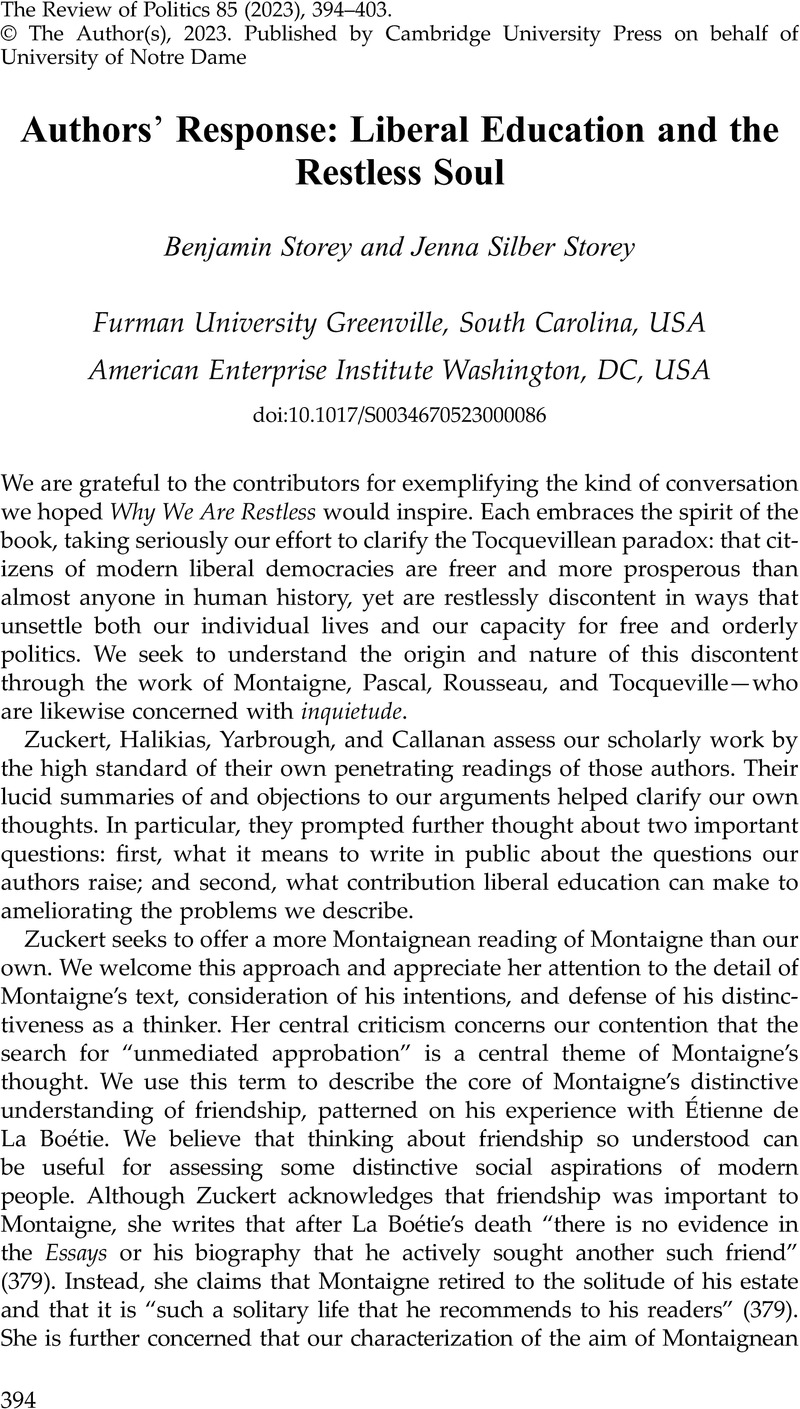No CrossRef data available.
Published online by Cambridge University Press: 18 July 2023

1 Desan, Phillipe, Montaigne: A Biography, trans. Rendall, Steven and Neal, Lisa (Princeton: Princeton University Press, 2017), 223Google Scholar. As Desan notes there, Montaigne enjoyed a “meteoric” ascent as an informal political operator, involving a great deal of social maneuvering, which Montaigne seems to have thrown himself into with gusto.
2 Montaigne's political career after his retirement from the Bordeaux parlement included both extensive shuttle diplomacy and two terms as mayor of Bordeaux. The work of writing the Essays helped him realize his social and political ambitions, and he wrote with those ambitions in mind. As Douglas I. Thompson points out, when Montaigne first published the Essays in 1580, he rode off to Paris to present copies to the king and his court by hand. Thompson, Douglas I., Montaigne and the Tolerance of Politics (Oxford: Oxford University Press, 2018), 9CrossRefGoogle Scholar.
3 Montaigne, Essays, 3.9.981 [911]. References to Montaigne's Essays give book, chapter, and page numbers for Pierre Villey's French edition (Paris: Presses Universitaires de France, 1924), followed by page numbers in brackets for the translation of Donald M. Frame in his Complete Works of Michel de Montaigne (New York: Everyman's Library, 2003).
4 Montaigne, Essays, 2.17.661–62 [610].
5 Ibid., 2.28.188 [169].
6 Ibid., 2.18.665 [612].
7 Ibid., 3.2.805 [741]. We hope that readers would benefit from reflecting on the most original and serious expression of the ambition to lay oneself bare before the world that motivates the secular-confessional culture all around us, replete with tell-all autobiographies and a cult of oversharing. For it is only by reflecting on the highest motives of such thought that we can take its proper measure, and perhaps gain some resistance to the inflated expectations and frequent disappointments to which it seems to give rise.
8 Pascal, Pensées, S680/L418. References to the Pensées give fragment numbers according to Sellier's and Lafuma's numberings, following the practice of Roger Ariew's English translation (Indianapolis, IN: Hackett, 2004). For the French texts, we use that of the Œuvres complètes of Henri Gouhier and Louis Lafuma (Paris: Éditions du Seuil, 1963). The sophistication of Pascal's rhetorical considerations is well attested. As his sister, Gilberte Périer, puts it in her brief life of Pascal, he was deeply interested in “eloquence,” which he understood as an art consisting in knowledge of “certain relations which must be found between the heart and the mind of those to whom one speaks, and the thoughts and expressions which one uses.” Périer, Vie de Monsieur Pascal, in Œuvres complètes, 23. Pascal's nephew Étienne Périer describes the rhetorical intention of the Pensées as to speak to religiously “indifferent” readers. Étienne Périer, “Préface [à l’édition de Port Royal],” in Pensées, ed. Michel Le Guern (Paris: Gallimard, 2004), 44.
9 Pascal, Pensées, S192/L160.
10 Voltaire, Lettres philosophiques, no. 25, “Lettre sur les Pensées de M. Pascal,” in Mélanges, ed. Jacques Van Den Heuvel (Paris: Gallimard, 1961).
11 Nietzsche, Human, All-Too Human, trans. Paul V. Cohn (New York: Macmillan, 1913), “Assorted Maxims,” § 408.
12 Pascal, Entretien avec M. de Saci, in Œuvres complètes, 296; see also Why We Are Restless, 78 and 208n52.
13 Pascal, Pensées, S164/L131.
14 Rousseau, Jean-Jacques, Œuvres complètes, ed. Gagnebin, Bernard and Raymond, Marcel, vol. 3 (Paris: Gallimard, 1964), 105Google Scholar.
15 See Why We Are Restless, 15–16 and 198n9, and Brunstetter, Daniel R., “Benjamin Franklin's Three Montaignes: The Essays, the Éloges, the Man,” Montaigne Studies, no. 31 (2019): 1–16Google Scholar.
16 Tocqueville, Alexis de, Democracy in America, ed. Nolla, Eduardo, trans. Schliefer, James T. (Indianpolis, IN: Liberty Fund, 2010)Google Scholar, 2.3.8, 2.1.1–2.